本文目录
初次见面问候对话英语的拼音
与他人初次见面时,一些简单的打招呼英语口语对话。下面是我给大家整理的初次见面问候对话英语,供大家参阅!
初次见面问候对话英语1
1. Nice to meet you. 很高兴认识你。
二个素不认识的老美见面打招呼的方式很简单,就是一个人先说"Nice to meet you", 另一个人说 "Nice to meet you, too",然后相互握手。但人多的时候, 你不可能一个一个说 "Nice to meet you",这时简单说"Hi" 就可以了,但这么说不适用于比较正式的场合。
2. Give me a hug.给我一个拥抱吧。
如果两个人相识已久,见面再说"Nice to meet you" 反而显得有点见外。这时候通常问候一句 "How are you doing" 或者 "What's up" 比较好一些。如果两个人还是不错的朋友,就会彼此拥抱一下。当然啦,拥抱之前不一定要说 "Give me a hug",只要看到人家张开双手,你就可以迎上去拥抱啦。
3. Do you want to exchange numbers? 你想不想交换电话呢?
如果是学生的社交场合,要不要名片就不是那么重要了。这时你可以尝试跟对方交换电话号码。你可以说 "Do you want to exchange numbers" 或是直截了当要对方的电话 "Could I have your phone number"。当然,第一次见面就要对方电话感觉好像怪怪的,所以你也可以跟对方要 E-mail address 或是 ICQ number。总之要什么就根据当时的情况和你个人的企图来定了.
初次见面问候对话英语2
A: Hello. My name is Anna.
B: Hi Anna. My name is Tinna.
A: How do you do , Tinna.
B: Are you American?
A: No, I'm Chinese.
B: Nice meeting you, Anna.
A: Nice meeting you, too.
B: Bye, Anna.
A: Bye.
初次见面问候对话英语3
Why,hello,Green!
呃,你好,格林!
How are you,Mr Wang?
你好吗,王先生?
How have you been?
过得如何?
How are you feeling?
你觉得怎么样?
How have you been getting along?
过得怎样?
How are things?
过得如何?
How is everything with you?
过得如何?
How goes the world with you?
近况如何?
How goes it?
近来如何?
Where have you been up to?
近来在忙什么?
Where have you been?
你去哪儿了?
Where have you been keeping yourself?
你去哪儿了?
Haven't seen you for such a long time.
很长时间没看到你了。
00:35.14]It's quite a pleasant surprise!
真没想到会见到你!
Fancy meeting you here!
真想不到会在这儿遇见你!
How do you do?
你好。
Good morning,Mr.Black!
早上好,布莱克先生!
Hello,Mr./Mrs./MiBrown!
你好,布朗先生/女士/小姐!
How nice to see you!
很高兴见到你!
I'm glad to know you.
认识你真高兴。
I'm very glad to meet you.
很高兴遇见你。
It's a pleasure to meet you.
很高兴遇见你。
How very nice to meet you!
见到你真高兴!
I'm glad to have the opportunity to meet you here.
很高兴有这个机会让我在这儿遇见你。
Fine,thanks.
很好,谢谢。
Fine,just fine.
很好,很好。
Really fine.
真的很好。
Great!
好极了!
Fine,and you?
很好,你呢?
Just so-so.
马马虎虎。
Nothing much.
不怎么好。
Bearing up,bearing up.
马马虎虎。
Surviving,thanks.
凑合,谢谢。
Same as ever.
和以前一样。

英语初次见面问候语对话
初次见面的老外跟你说了句"How do you do", 估计多数人都会美滋滋地搬出学校教的那套,回敬一句"How do you do"。可英美人士却觉得你的回答有点买帽子当鞋穿--不对头。因为他们会觉得对话似乎没有得到回应,好像你并不高兴见到他一样。所以,当别人说"How do you do"的时候,你最好改答"Nice to meet you"或者"It's a pleasure to meet you"。下面是我整理的英语的初次见面问候语,欢迎参考!
英语的初次见面问候语一
1. How do you feel today?你今天觉得怎样?
2. I feel like a new man我觉得好像脱胎换骨了。
3. Are you ma-ki-ng progress?你有进展吗?
4. How com#e you look so tired?你怎么看起来这么疲倦?
5. Why are you in such a good mood?你怎么心情这么好?
6. You look under the weather today你今天好像不舒服。
7. Is anything wrong?有什么不对劲吗?
8. Have gotten over your cold?你感冒好了吗?
9. Did you sleep soundly last night?你昨晚睡得好吗?
10. What’s the matter? Don’t you feel well?怎么了?你不舒服吗?
11. Why are you so crotoday?你今天怎么这么容易生气?
12. You look tiredHad a big night?你看起来很疲倦。昨晚刺激吗?
13. Greetings with People Met Often问候常见面的'人
14. How are you doing? I can’t com#plain too much你好吗?我不能太抱怨。(还不错)。
15. How is your businegoing?你生意做得怎样?
16. How are things going?事情进行得怎样?
17. How is your day going?过得如何?
18. How’s everything with you?你的一切如何?
19. Hi! Are you having fun?嗨,你过得愉快吗?
20. How have you been (feeling)?你近来如何?
英语的初次见面问候语二
1. Nice to meet you(适用于第一次见面)很高兴见到你。
2.Nice to see you again(适用于曾经见过,但不太熟的人)很高兴再见到你。
3.How have you been?(适用于有一阵子没见面的朋友) 你过得怎么样?
4.Long time no see(适用于很久没见的朋友)好久不见
5.How is it going?近况如何。
6.How’s everything with you?你的一切如何?
7.Hi! Are you having fun?嗨,你过得愉快吗?
8.How have you been (feeling)?你近来如何?
9. So far so good到目前还好。
10.Greetings with People Met Often问候常见面的人
11.Hi, there!嗨,哈罗!
12.How are you doing? I can’t complain too much你好吗?我不能太抱怨。(还不错)。
13.How is your business going?你生意做得怎样?
14.How are things going?事情进行得怎样?
15.How is your day going?过得如何?
16.How are you doing these days? Well, about the same最近好吗?嗯,差不多一样。
17.What’s new?近况如何。
18.How do you feel today?你今天觉得怎样?
19.I feel like a new man我觉得好像脱胎换骨了。
20.Are you making progress?你有进展吗?
英语的初次见面问候语三
1. Hi, there!嗨,哈罗!
2. How are you?你好吗?
3. Nice to meet you(适用于第一次见面)很高兴见到你。
4. Nice to see you again(适用于曾经见过,但不太熟的人)很高兴再见到你。
5. How have you been?(适用于有一阵子没见面的朋友) 你过得怎么样?
6. Long time no see(适用于很久没见的朋友)好久不见
7. How is it going?近况如何。
8. So far so good到目前还好。
9. How are you doing these days? Well, about the same最近好吗?嗯,差不多一样。
10. What’s new?近况如何。
11.Have gotten over your cold?你感冒好了吗?
12.Did you sleep soundly last night?你昨晚睡得好吗?
13.What’s the matter? Don’t you feel well?怎么了?你不舒服吗?
14.Why are you so cross today?你今天怎么这么容易生气?
15.You look tiredHad a big night?你看起来很疲倦。昨晚刺激吗?
16.How come you look so tired?你怎么看起来这么疲倦?
17.Why are you in such a good mood?你怎么心情这么好?
18.You look under the weather today你今天好像不舒服。
19.Is anything wrong?有什么不对劲吗?
20.Where are you headed?你去哪里?
21.I’m on my way to the library我要去图书馆。
22.Where have you been?你去哪里了?

初次见面打招呼用语英文
英语对于不同国家与地区的人们的交流与沟通起着越来越重要的作用。下面我为你整理了初次见面打招呼礼貌用语英语,希望对你有所帮助!

初次见面打招呼礼貌用语英语(精选篇)
1. What shall we do tonight? 我们今天晚上去干点儿什么呢?
2. What's your goal in life 你的人生目标是什么?
3. When was the house built? 这幢房子是什么时候建造的?
4. Why did you stay at home? 为什么呆在家里?
5. Would you like some help? 今天真漂亮!
6. You mustn't aim too high 你不可好高骛远。
7. You're really killing me! 真是笑死我了!
8. You've got a point there. 你说得挺有道理的。
9. Being criticized is awful! 被人批评真是痛苦!
10. Did you enter the contest? 你参加比赛了吗?
初次见面打招呼礼貌用语英语(最新篇)
1. I heard some one laughing. 我听见有人在笑。
2. I suppose you dance much. 我想你常常跳舞吧。
3. I walked across the park. 我穿过了公园。
4. I'll just play it by ear. 我到时随机应变。
5. I'm not sure I can do it. 恐怕这事我干不了。
6. I'm not used to drinking. 我不习惯喝酒。
7. Is the cut still painful? 伤口还在痛吗?
8. It's too good to be true! 好得难以置信。
9. Jean is a blue-eyed girl. 珍是个蓝眼睛的女孩。
10. Let's not waste our time. 咱们别浪费时间了。
11. May I ask some questions? 我可以问几个问题吗?
12. Money is not everything. 金钱不是一切。
13. Neither of the men spoke. 两个人都没说过话。
14. Stop making such a noise. 别吵了。
15. That makes no difference. 没什么区别。
16. The price is reasonable. 价格还算合理。
17. They crowned him king. 他们拥立他为国王。
18. They're in red and white. 他们穿着红白相间的衣服。
19. We all desire happiness. 我们都想要幸福。
20. We just caught the plane 我们刚好赶上了飞机。
初次见面打招呼礼貌用语英语(经典篇)
1. I meet the boss himself. 我见到了老板本人。
2. I owe you for my dinner. 我欠你晚餐的钱。
3. I really enjoyed myself. 我玩得很开心。
4. I'm fed up with my work! 我对工作烦死了!
5. It's no use complaining. 发牢骚没什么用。
6. She's under the weather. 她心情·不好。
7. The child sobbed sadly. 小孩伤心地抽泣着。
8. The rumor had no basis. 那谣言没有·根据。
9. They praised him highly. 他们大大地表扬了他。
10. Winter is a cold season. 冬天是一个,寒冷的季节。
11. You can call me any time. 你可以随时打电话给我。
12. 15 divided by3 equals 5. 15除以3等于5。
13. All for one,one for all. 我为人人,人人为我。
14. East,west,home is best. 金窝,银窝,不如自己的草窝。
15. He grasped both my hands. 他紧握住我的双手。
16. He is physically mature. 他身体己发育成熟。
17. I am so sorry about this. 对此我非常抱歉(遗憾)。
18. I can't afford a new car. 我买不起一部新车。
19. I do want to see him now. 我现在确实很想去见他。
20. I have the right to know. 我有权知道。
美国人第一次见面打招呼的英语对话
在我国,对话教学是伴随新课程改革而出现的一种新的教学形态,在近几年倍受关注。我整理了第一次见面打招呼英语对话,欢迎阅读!
第一次见面打招呼英语对话一
xian: hello,my name is xian.what's your name?
你好,我叫冼.你叫什么名字?
lingling: hello,my name is lingling,nice to meet you.
你好,我叫玲玲,很高兴认识你.
xian: nice to meet you too,where are you going?
我也很高兴能认识你,你要去那里呢?
lingling: the weather is very good,today.i'm going to the bookstore. would you like to go with me?
今天天气很好,我要去书店看看.你要去吗?
xian: yes ,i also want to take a look there.
好的,我也想去看看.
lingling: ok! let's go!
好的,我们走吧
第一次见面打招呼英语对话二
Tom: Are you a teacher here?
Martin: No I'm not, I'm actually a graduate student.
Tom: Oh right.
Martin: My name is Martin.
Tom: Hi.
Martin: Hi how are you?
Tom: I'm Tom.
Martin: Nice to meet you Tom.
Tom: Where are you from Martin?
Martin: I'm from Seattle, Washington in the US.
Tom: Is that in the Northeast? Northwest?
Martin: Northwest. Right near Canada.
Tom: Is it cold up there?
Martin: It's wetter than it is cold.
Tom: How long have you been in Japan.
Martin: I've been in Japan for about 6 months.
Tom: And what are you studying?
Martin: I'm studying international cooperation and economics and nationalism in Northeast Asia.
Tom: Is that a master's level or a Ph.D.?
Martin: Master's level.
Tom: Right. How long is the course?
Martin: Oh, it's about 2 years so I'll be done in another year.
Tom: So you're fairly settled here then?
Martin: By and large, yes. How about you?
Tom: I'm from the UK. Actually I'm a teacher here. I'm not studying.
Martin: Oh, how long have you been a teacher here?
Tom: I just started this semester about 2 months ago.
Martin: Oh 2 months — very, very recent. How do you find Japan?
Tom: It's brilliant. I really like it.
Martin: Have you been in Japan a long time or...?
Tom: I was in Japan 4 years ago for 2 years. I've been trying to come back since I left.
Martin: I find Japan very, very, very nice. The environment is very nice.
Tom: I mean this is quite a small city...
Martin: I lived in Seoul for about 3 and a half or 4 years and it's nice to have a smaller cleaner city that's a little more laid-back, not so rush rush.
Tom: So tell me about your day. What do you do in a day?
Martin: Generally pretty standard, you know, come up to campus in the morning, study, have class, and then read a little bit, go to the library, and then go back home and go off to work in Oita.
Tom: You work?
Martin: Yeah, just in Oita for one or two days a week.
Tom: OK. Oh that sounds like a nice schedule.
Martin: Yeah, how about you? You're here for how long a day?
Tom: Oh. I get the first bus up in the morning. It gets me here at about 8 o'clock. I have only 3 classes in a day so it's only, what, about four and half hours of teaching. The rest of the time is preparing the lessons, marking the homework, surfing the internet, using the library as well. And then I head home about 6 o'clock.
Martin: Doesn't sound...well, a little busier but...
Tom: It's quite a relaxing schedule, not too intense. And getting home at 6 or 7, I've still got time for a swim or to cook something in the evening.
Martin: Do you go to the club down there or...?
Tom: The public swimming pool next to the park.
Martin: Ah, OK.
Tom: Have you been there?
Martin: No I haven't. But I've walked by there.
Tom: Do you live in that part of Beppu?
Martin: I live in Kanagawa so quite far away from everywhere else but it's nice and very, very quiet.
Tom: That seems like it's important to you.
Martin: As I get older, it gets more important, so.
第一次见面打招呼英语对话三
Hello, Mr. Tanaka. Welcome to Silicon Valley Software.
你好,田中先生。欢迎光临硅谷软件公司。
I'm Jack, VP of Sales. Very nice to meet you.
我是杰克,销售副总裁。很高兴见到您。
I'm Takashi Tanaka, General Manager of Tokyo Technology.
我是田中高志, 东京科技总经理。
It's nice to meet you as well. Please call me Taka.
我也很高兴见到您。请叫我塔卡。
I'm Victoria, VP of Marketing. It's great to finally meet you face to face.
我是维多利亚,市场营销副总裁。很高兴终于可以面见您。
After speaking so often on the phone, it's nice to "put a face with the voice".
电话里交谈那么频繁后,很高兴可以“把声音和面容连到一起”。
Thank you for coming all the way from Japan to visit our company.
很感谢您从日本远道而来拜访我们的公司。
We've been looking forward to meeting you today. How was the flight?
我们一直期待着今天见到您。飞行旅程还好吗?
It was long, but very good. I just arrived at San Francisco airport 3 hours ago.
很漫长,但非常好。3个小时前我刚刚到达旧金山机场。
Wow, you must be tired from the long flight. Is the jet lag bothering you?
哇,长途飞行您一定累了。时差困扰您了吗?
I'm fine. I was able to get some sleep on the airplane.
我还好。在飞机上我睡了一会。
Would you like something to drink?
您想要喝点什么吗?
We have coffee, tea, soda and water here.
我们这里有咖啡,茶,苏打水还有水。
Oh, thank you. I could use some coffee.The caffeine will help me stay awake during the meeting.
哦,谢谢。我想要点咖啡。咖啡因可以帮我在开会时保持清醒。
Of course. My assistant will bring it for you right away.
当然可以。我的助理会马上给您送来。

以上就是关于第一次见面打招呼 英语,初次见面问候对话英语的拼音的全部内容,以及第一次见面打招呼 英语 的相关内容,希望能够帮到您。

